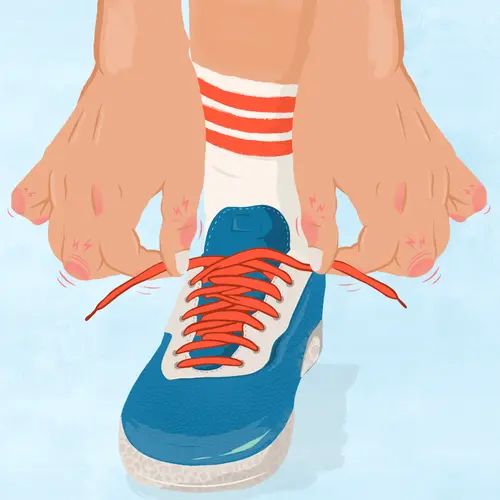That doesn't sound right, does it? The last thing rheumatoid arthritis does is help anyone, least of all you as a parent or your kids, right? Some days RA can keep you from doing all the things you’d like to do. It makes it harder to open a jar of baby food, braid hair, or play catch.
But moms with arthritis -- as well as medical experts -- say you may also find that RA can teach your children important lessons as they watch you cope and learn how to help you along the way.
“I’ll often see people who are now in their 40s and 50s, who have vivid memories of being a child and their mother or father suffered from this disease,” says John Klippel, MD, president and CEO of the Arthritis Foundation. “They’re now involved with the Foundation as donors or volunteers, simply because they remember what their mom or dad went through and what it meant for them to have rheumatoid arthritis.”
Here are some of the "life lessons" that your kids may learn from your RA:
Can RA Teach Your Kids To Be Selfless?
The volunteers and donors Klippel regularly works with learned early on that there are people in pain and people who need help. Their childhood memories have inspired them to get personally involved with a cause that means a lot to them. “I think it teaches kids the importance of walking in someone else’s shoes, and wanting to make a difference in the lives of others,” Klippel says. “There’s a great opportunity for kids in a family affected by RA to see life through the eyes of somebody else.”
How RA Can Teach Empathy
Keri Cawthorne, a fitness instructor in Vermont, was diagnosed with RA last year and has seen its impact on her 10-year-old daughter. “She’s very concerned for me, and about the fact that I have to be on medicine for the rest of my life,” she says. “She’s a ballplayer and when we throw the ball outside, she’s always careful to make sure she doesn’t hurt me. She’s always asking me if my hands and feet are sore and if she can rub them.”
Katie Anderson’s 5-year-old daughter Delaney has always lived with her mother’s RA. “I was diagnosed six years before she was born,” says Anderson, who retired as a flight attendant because her travel schedule made her disease worse. She's now a real estate agent. “She’s so compassionate, and I think it’s partly because of what she sees me go through. She hates to see anyone in pain, and whenever someone else is crying, she cries too.”
Learning Self-Reliance From Mom's RA
You know those teeny-tiny Barbie shoes and outfits? Because of her RA, Anderson’s fingers can’t get those little things on Delaney's dolls. Instead, Delaney had to learn to dress her own dolls and do other tasks independently.
“I put her juice boxes and yogurts on the lowest level of the refrigerator, and she’ll go and get her own drinks and snacks for herself,” Anderson says. “At school, I see a lot of moms carrying three or four backpacks for their kids, but Delaney carries her own. Probably because I’ve had [RA] since before she was born, she accepts that this is the way life is.”
She’s also learning, says Laurie Ferguson, PhD, a psychologist and vice president of research and education at the arthritis advocacy group, CreakyJoints.
“Often, we expect too little of our children,” Ferguson says. “We don’t invite them to be partners in activities that will help them to grow up into the human beings we want them to be. Try to look at the illness through this lens, as an opportunity for your child to learn and grow.”
RA: Perspective and Patience
Delaney knows there are a lot of things her mom can’t do. “I can’t open jars, I can’t even lock her into her car seat very well,” Anderson says. “If my husband isn’t around, she has to be very patient with me and understand that it takes a little more time.”
Ellen Shmueli, a fitness trainer, was 28 and a new mom when she developed RA. Her son, who’s now 13, learned early on to adjust to his mom’s limitations. “When I put him in a real bed, he used to want to jump to me, and my hands were so bad I’d have to pick him up under his arms with my wrists,” Shmueli says. “I’d tell him, ‘Mommy’s hands are sick and I have to pick you up like this.’ He got that, and he’d wait for me to be ready for him and have my wrists out, and then he’d jump to me and grab around my neck.”
Seeing Mom's Courage With RA
“Most of us who don’t have a chronic disease have it easy. We think we know what stress means, but if you impose a serious chronic illness like RA on to the normal stresses of life, it amazes me the individual strength and courage that people with RA have,” Klippel says. “When Mom has a severe chronic disease, and yet she’s coping with it, a child will see strength and courage that they might not otherwise see in a parent.”
Ferguson says, “When you deal with a chronic debilitating illness like RA, many things in life are triumphs. It gives your child a great sense of ‘I can.’ Illness doesn’t have to run your life. You can still be in charge, deal with things, and bounce back. Those are enormous life lessons.”

